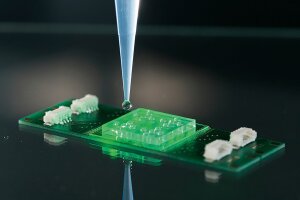News
Gesicht mit Farbe. Symbolbild Jenaer Erklärung. Menschenrassen gibt es nicht.
Image: FotoliaHuman races do not exist
When the German Zoological Society hosted its annual conference at the Friedrich Schiller University Jena in September 2019, it published the »Jena Declaration« to present »race« as a racist construct. The authors urged people to stop using the term and to make a stand against racial discrimination. The »Jena Declaration« has been endorsed by the President of the Friedrich Schiller University Jena and the Executive Board of the German Zoological Society.
The document states that the classification of humanity into »races« has led to the persecution, enslavement, and slaughter of millions of people. Even today, the term »race« is still frequently used in connection with human groups. »However, there is no biological basis for this and there has never been one,« note the authors of the Jena Declaration. They add: »The concept of race is the result of racism, not its prerequisite.«
The »Jena Declaration« and other related information can be found online: www.uni-jena.de/en/190910_JenaerErklaerung_EN. [KB]
Visualisierung CeTraMed
Image: QUELLE ANGEBENFoundations laid for »CeTraMed«
On 17 September 2019, building work got under way for the Centre for Translational Medicine (CeTraMed) at Jena University Hospital, where 14 research groups will investigate age-related diseases. The research building will cost around 28.3 million euros, half of which will be provided by the federal government. An additional 9.5 million euros will be contributed by the Free State of Thuringia; the project is also being funded by the University Hospital. The new building will be completed by 2022. [AL]
Prof. John Goodenough
Image: Anne Günther (University of Jena)Nobel Laureate in Chemistry from Jena
In 2019, the Nobel Prize in Chemistry was awarded to the US scientist John Bannister Goodenough, an academic member of the Friedrich Schiller University Jena. The 97-year-old laureate was honoured for his contribution to the development of lithium-ion batteries alongside Stanley Whittingham from the UK and Akira Yoshino from Japan. The Nobel Committee lauded the work carried out by the three researchers for having profoundly influenced and changed the world we live in. Lithium-ion batteries have enabled the transition from stationary to portable electronic devices and advanced the evolution of mobility from fossil fuels to electric-powered vehicles.
This ground-breaking scientific work is precisely what led the University of Jena to present Goodenough with an honorary doctorate in 2018. The photo on the left shows the Nobel Laureate during his visit to the University in 2018, when he received his honorary doctorate. He is holding an excerpt from the birth register of 1922 in his hand—Goodenough was born in Jena. [sl]
New facilities for innovative energy storage
The construction of a new research building will create around 2,000 square metres of usable space at the Centre for Energy and Environmental Chemistry (CEEC) at the Friedrich Schiller University Jena. The »CEEC Jena II« will not only enable special investigations to be conducted on the innovative energy storage materials developed at the University of Jena; the research results will be made ready for industrial use at the integrated application centre.
The four-storey building has been designed by the architectural firm HDR GmbH. It will be completed by 2022, housing specialized laboratories, offices, and a technical centre.
Innovative concepts for new batteries, printed solar cells, and integrated façades for energy conversion are being developed at the CEEC Jena. »One of our goals is to develop safe and sustainable batteries that can function without vanadium, cobalt, and rare elements,« explains the Director of the CEEC, Prof. Dr Ulrich S. Schubert. [MK]
An der Universität Jena werden am 14.10.2019 erste Pläne für die Kommunikationszentren "Focus" auf dem Beutenberg und "Forum" neben dem Universitätsgebäude vorgestellt.
Image: Jan-Peter Kasper (University of Jena)Two new communication centres
Communication and interaction are two essential aspects of science, which is why two new communication centres are planned in Jena: the FORUM in the city centre next to the Main Building of the Friedrich Schiller University (shaded black in the picture left) and the FOCUS building on the Beutenberg Campus. The new buildings are being funded by the Carl Zeiss Foundation, which has donated 18.4 million euros to the project.
JenaVersum relocates to the FORUM
»Jena has become an important city that attracts top-level researchers and young talent from around the world. In addition to excellent research centres and high-tech buildings, we require open and central spaces for interdisciplinary interaction, intercultural exchange, and for a noticeably welcoming culture,« emphasizes University President Prof. Dr Walter Rosenthal.
The new buildings will house conference rooms, dining facilities, and living spaces for visiting scientists and scholars. The newly founded »Jena- Versum«, a cooperative network between the University and its partners, will also be based in the FORUM. [AB]
Less animal testing
In October 2019, Jena University Hospital received the Thuringia Animal Welfare Award for its »Critical Incident Reporting System for Laboratory Animal Science« (CIRS-LAS), an anonymized system used at multiple institutions throughout Europe. The aim is to learn from other people’s mistakes and prevent such incidents in the future. The project team evaluates failure reports and makes the information available to registered users. This helps to minimize the amount of animal testing in research while improving the safety of studies and treatments and preventing unnecessary studies. [vdG]
Leibniz-Institut für Photonische Technologien
Image: Sven Döring/Agentur FocusNew Leibniz Research Centre
The Federal Ministry of Education and Research (BMBF) is contributing around 150 million euros for the construction of a Leibniz Research Centre in Jena. The Leibniz Centre for Photonics in Infection Research (LPI) will provide the necessary facilities for technology developers, phyisicians, and medical technology manufacturers to conceptualize and trial light-based technologies for the improved diagnosis and treatment of infections.
Infectious diseases are some of the most common causes of death around the world. Photonic diagnostic methods are particularly effective in the fight against infections, as they enable quick and sensitive measurements, allowing patients to be treated earlier and in a more targeted manner. [LME]




